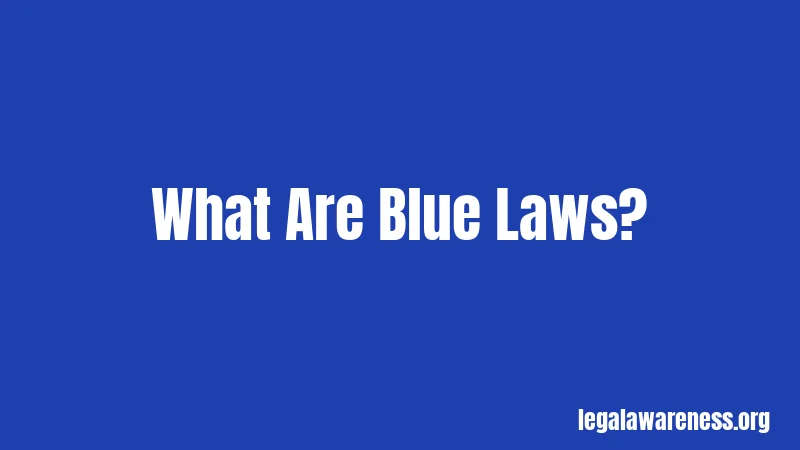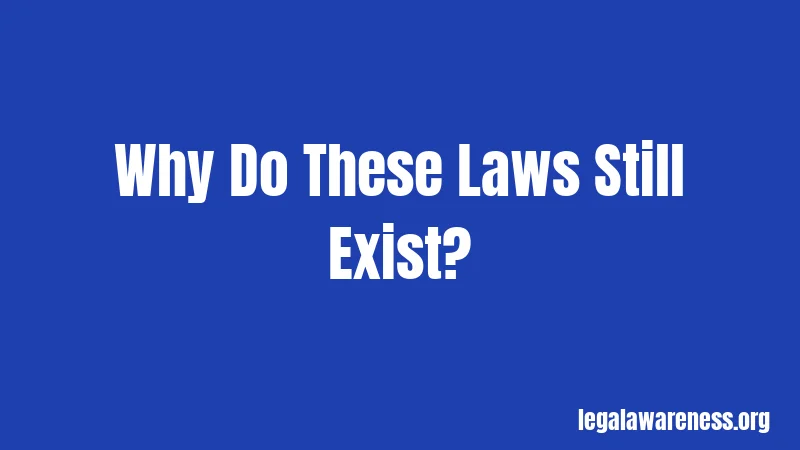Blue Laws in Texas (2026): Sundays, Liquor, and Cars
Most people don’t even know these laws exist. Seriously. But in Texas, blue laws still control when you can buy alcohol and cars. The penalties can hit hard if you break them. Let’s break down exactly what you need to know.
Blue laws date back to colonial times. They were created to protect Sunday as a day of worship and rest. Texas passed its first blue laws in 1961. Most got repealed in 1985. But two big ones stuck around: alcohol sales and car sales.
What Are Blue Laws?

Blue laws restrict certain activities on Sundays. They’re named after the color of paper they were supposedly printed on. Think of it like a mandatory day off, but enforced by law.
The original Texas blue laws were strict. You couldn’t buy pots and pans on Sunday. Can’t buy washing machines either. Even furniture was off-limits. Pretty much anything except food and medicine was banned.
That changed in 1985. The state repealed most of these silly restrictions. But liquor and car sales? Those rules are still here.
Alcohol Blue Laws in Texas
Here’s the deal. Texas treats different types of alcohol differently. The rules depend on what you’re buying and where you’re shopping.
Beer and Wine Sales
You can buy beer and wine at grocery stores and gas stations. Here’s when:
Monday through Friday: 7 a.m. to midnight. Saturday: 7 a.m. to 1 a.m. Sunday morning. Sunday: 10 a.m. to midnight.
Wait, it gets better. That Sunday rule changed recently. Before September 2021, you had to wait until noon. House Bill 1518 moved it to 10 a.m. Two extra hours might not sound like much. But tell that to someone planning brunch.
Liquor Store Hours
Liquor stores have it rough. They can’t open at all on Sunday. Not even for one hour. Completely closed.
When they can open:
Monday through Saturday: 10 a.m. to 9 p.m. Sunday: Closed. No exceptions.
Major holidays are also off-limits. Thanksgiving Day? Closed. Christmas Day? Closed. New Year’s Day? Closed.
Hold on, this part is important. If Christmas or New Year’s falls on Sunday, stores stay closed Monday too. That means a two-day shutdown.
Bars and Restaurants
Restaurants are different. They can serve alcohol on Sunday. But there’s a catch.
Sunday alcohol service starts at noon. Between 10 a.m. and noon, you must order food with your drink. After noon, drink-only service is fine.
Hotel bars got a special deal in 2021. They can serve alcohol to guests anytime. Day or night. But only to registered guests.
Wondering if this applies to you? If you’re eating at a restaurant on Sunday morning, you’ll need to order food with that mimosa before noon.
Wine with Higher Alcohol Content
This one’s tricky, honestly. Some wines are stronger than others. Texas law treats them differently.
Wine-only package stores can sell regular wine on Sunday if they have a beer license. But fortified wine? That’s wine over 17% alcohol by volume. Port, sherry, vermouth. Those are banned on Sunday.
Wineries have their own rules. They can operate from 10 a.m. to midnight on Sunday. That’s because they sell wine they made themselves.
Car Dealership Blue Laws

Texas doesn’t ban Sunday car sales completely. The rule is different here. Dealerships must close one weekend day. Either Saturday or Sunday.
Most choose Sunday. It’s become the standard. But legally, they could close Saturday instead.
The Specific Law
Section 728.002 of the Transportation Code is clear. You cannot sell cars on consecutive Saturday and Sunday days. Pick one. Close for business.
This applies to more than just cars. Motorcycles, golf carts, ATVs. Any self-propelled vehicle with two or more wheels.
Yep, that’s all you need. One day off per weekend.
Who This Affects
Professional car dealerships must follow this rule. Private sellers? They’re exempt. Selling your personal car on Facebook Marketplace is fine. Do it whenever you want.
The law specifically says “occasional sale of a motor vehicle by a person not in a business” is allowed. So garage sales and private deals don’t count.
Penalties for Breaking Blue Laws
Not sure what counts as a violation? Let me break it down.
Alcohol Violations
Businesses that sell alcohol outside legal hours face serious consequences. The Texas Alcoholic Beverage Commission (TABC) doesn’t mess around.
Penalties include:
License suspension. License revocation. Heavy fines.
Individual employees can face criminal charges too. Selling alcohol during prohibited hours is a crime. Don’t risk it.
Car Dealership Violations
Car dealers face civil penalties. Each violation gets fined separately. That means every single car sold on a prohibited day counts.
First violation: Up to $500. Second violation: $500 to $1,000. Third or subsequent violations: $1,000 to $5,000.
Here’s where it gets serious. If you knowingly violate the law with “conscious indifference,” the court can triple the penalty. A $5,000 fine becomes $15,000 real quick.
Each day counts as a separate violation. Each sale counts as a separate violation. Open both Saturday and Sunday? You’re racking up penalties fast.
How Violations Get Reported
Most people assume nobody’s watching. They find out the hard way. Competitors report violations constantly.
One dealership tries to gain an edge. Opens both weekend days. A competitor calls it in. Totally legal to report them. Happens all the time.
Why Do These Laws Still Exist?

You’re not alone, this confuses a lot of people. Why keep laws based on religion in 2026?
The U.S. Supreme Court says blue laws are constitutional. They cite secular reasons. Worker rest. Family time. Community stability.
The Car Dealer Perspective
Car dealerships actually support the blue law. Sounds weird, right? But think about it.
Sales staff work long hours. Six days a week is already tough. A guaranteed day off helps. Dealerships can attract better employees this way.
It also saves money. Keeping a showroom open costs cash. Heat, electricity, staff salaries. If your competitors are closed too, you’re not losing sales.
The Alcohol Industry View
Liquor store owners are split. Some want Sunday sales. More revenue, more hours for employees. Makes sense.
Others prefer the day off. They don’t want to work seven days a week. Competing against stores that stay open sounds exhausting.
Beer and wine retailers got a win in 2021. That extra two hours on Sunday morning helps. Brunch culture is huge in Texas cities.
Recent Changes and Failed Attempts
Texas lawmakers try to change these laws every session. Most bills die in committee.
Successful Changes
House Bill 1518 passed in 2021. It moved Sunday beer and wine sales from noon to 10 a.m. Not a huge change. But it’s something.
The bill also allowed hotel bars to serve guests anytime. That was a bigger deal for tourism.
Failed Attempts
Senate Bill 785 in 2019 would’ve let liquor stores open on Sunday. Business owners could choose. The bill died in committee.
House Bill 1100 also tried to legalize Sunday liquor sales in 2019. Same result. Didn’t make it out of committee.
Multiple bills tried to extend Saturday hours for liquor stores. Opening at 9 a.m. instead of 10 a.m. Staying open past 9 p.m. None passed.
Senate Bill 441 in 2015 would’ve ended the car dealership restriction. Dealers could open both weekend days. It failed too.
Special Circumstances and Exceptions
Confused about the difference? Let me clarify.
Private Vehicle Sales
Private citizens can sell cars whenever they want. Sunday sales are fine. This only applies to dealers in the business of selling vehicles.
Car Shows and Exhibitions
Dealerships can display vehicles at shows on Sunday. They just can’t actually sell them. Quoting prices for motor homes and tow trucks is allowed.
Wine Tastings and Festivals
Wine festivals can serve from 10 a.m. to noon on Sunday with proper permits. Food must be available though.
Wineries operate under different rules than package stores. They can sell their own wine on Sunday.
Local Variations
Cities and counties can’t override state blue laws. State law supersedes local authority. But they can add extra restrictions.
Some counties are “dry.” Alcohol sales are banned completely. That’s 39 out of 254 Texas counties.
How to Stay Compliant
Here’s what you need to do if you sell alcohol or cars.
For Alcohol Retailers
Know your license type. Different permits have different rules. A mixed beverage permit has different hours than a beer license.
Post your legal hours clearly. Customers need to see them. TABC inspectors will check.
Train your employees. They need to know the rules cold. One mistake can cost your license.
Set alarms or reminders. When closing time approaches, announce it. Give customers warning.
For Car Dealerships
Choose your closing day. Saturday or Sunday. Stick to it. Don’t change week to week.
Train all staff. Everyone needs to understand the law. Even office staff who might answer phones.
Make your hours clear on advertising. Website, social media, signage. All of it.
Don’t get creative on holiday weekends. Memorial Day weekend? Fourth of July? Still can’t open both days.
What Happens If You Make a Mistake
Honestly, this is the part most people miss. Mistakes happen. The question is what you do next.
Contact the appropriate agency immediately. TABC for alcohol. Texas Department of Motor Vehicles for car sales.
Document what happened. Write down the details. When, how, who was involved.
Fix the problem. Retrain staff. Update procedures. Show you’re taking it seriously.
Small, honest mistakes might get warnings. Repeated violations? Intentional violations? Those bring the hammer down.
Comparing Texas to Other States
Many people don’t realize how strict these laws are. Let’s put it in perspective.
Nevada has zero blue laws for alcohol. You can buy liquor 24/7. Any day of the week.
Thirteen states restrict Sunday car sales completely. Illinois, Indiana, Iowa, Louisiana, Maine, Maryland, Michigan, Minnesota, Missouri, New Jersey, North Dakota, Oklahoma, Pennsylvania.
Texas is actually middle-of-the-road. We’re not the strictest. But we’re far from the most relaxed.
Some states repealed all their blue laws decades ago. California, for example. You can buy anything, anytime.
The Debate Continues
Should Texas repeal these laws? People are split.
Arguments for Repeal
Religious freedom matters. Blue laws force Christian values on everyone. Not everyone observes Sunday as holy.
Economic benefits could be huge. More sales mean more tax revenue. The state needs money for education and infrastructure.
Consumer convenience counts. Modern life is busy. People want to shop when they have time.
Arguments for Keeping Blue Laws
Workers deserve rest. Guaranteed time off protects employees. Especially low-wage retail workers.
Community values matter. Some traditions are worth preserving. Sunday as a family day has value.
Economic impact might be minimal. If you need a car, you’ll buy it Monday. Sales just shift, they don’t increase.
What’s Next?
The 2025 legislative session saw new proposals. Some succeeded. Most didn’t. The pattern continues.
Expect more bills in 2027. Someone always tries. Sometimes they chip away small pieces. Full repeal seems unlikely.
Public opinion is shifting though. Younger Texans oppose blue laws more than older generations. That trend matters long-term.
Frequently Asked Questions
Can you buy beer on Sunday in Texas?
Yes. Beer sales start at 10 a.m. on Sunday at grocery and convenience stores. You can buy until midnight.
Are liquor stores open on Sunday in Texas?
No. Liquor stores must remain closed all day Sunday. They also close on Thanksgiving, Christmas, and New Year’s Day.
Can restaurants serve alcohol on Sunday in Texas?
Yes. Restaurants can serve alcohol starting at noon on Sunday. From 10 a.m. to noon, you must order food with alcohol.
Do car dealerships have to close on Sunday in Texas?
No, but they must close either Saturday or Sunday. They cannot be open both days. Most choose Sunday.
What happens if a car dealer sells on both weekend days?
They face civil penalties ranging from $500 to $5,000 per violation. Each sale counts separately. Penalties can triple for willful violations.
Can I buy a car from a private seller on Sunday?
Yes. The blue law only applies to licensed dealerships. Private sales between individuals are allowed anytime.
Why does Texas still have blue laws?
The laws originally had religious purposes. Now they’re justified as protecting worker rest and family time. The Supreme Court upheld them on secular grounds.
Can cities or counties make stricter blue laws?
No for blue laws specifically. State law controls alcohol and car sales. But counties can be “dry” and ban alcohol sales completely.
Final Thoughts
Texas blue laws are complicated. But the basics are simple. No liquor on Sunday. Car dealers close one weekend day. Follow these rules or face penalties.
The laws might seem outdated. Many people want them gone. But they’re still here. Still enforced. Still causing fines for people who don’t know better.
Now you know the basics. Plan your shopping accordingly. Need liquor for a Sunday cookout? Buy it Saturday. Want to buy a car this weekend? Check if your dealer is open.
Stay informed, stay legal, and when in doubt, double-check the hours before you go.
References
- Texas Alcoholic Beverage Code, Chapter 105 – Official state statute governing alcohol sale hours
- Texas Transportation Code, Section 728.002 – Motor vehicle sales restrictions
- Texas Alcoholic Beverage Commission (TABC) – Regulatory agency for alcohol laws
- Understanding Texas Blue Laws – Cofer Luster Criminal Defense – Comprehensive guide to current regulations
- Texas House Bill 1518 (2021) – Recent legislative changes to Sunday alcohol hours
